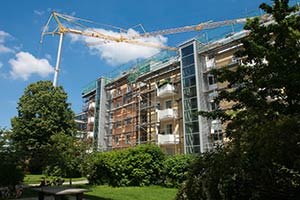Current
informs.
All news at a glance.

We keep you up to date
We bring you the latest developments and news directly to your screen!
Current dates and developments always in view.
Changes in 2023 for real estate buyers and owners
For real estate, there will be a higher depreciation rate in 2023, tax relief for smaller photovoltaic systems and changes to valuation law.
A lot has also changed for current and future homeowners at the turn of the year. There has already been some media hype about the relief for smaller photovoltaic systems, but there are still many unanswered questions that the tax authorities have yet to answer. Shortly before the turn of the year, there was almost even more hype about the changes to valuation law, which primarily affect inheritance and gift tax. However, there are other changes relating to real estate - here is an overview:
-
Depreciation of buildings: The annual straight-line depreciation rate for buildings completed after December 31, 2022 that are used for residential purposes will be increased from 2 % to 3 % of the acquisition or production costs, thereby shortening the depreciation period from 50 to 33 years. In return, the planned abolition of the exception rule, according to which the depreciation period can be calculated according to an actually shorter useful life in justified exceptional cases, was not implemented. The Federal Ministry of Finance has therefore already commented on how depreciation will be calculated in future according to a shorter useful life (see article "Depreciation of buildings according to a shorter useful life").
-
Construction of new rental apartments: The previous version of the special depreciation allowance for the construction of new rental apartments expired at the end of 2021. As the government continues to pursue the goal of boosting housing construction, the special depreciation allowance has now been relaunched, albeit with modified conditions. Landlords can still claim up to 20 % of the acquisition or production costs as special depreciation within the first four years. However, in future, the claiming of depreciation will also be linked to compliance with certain energy efficiency requirements. In particular, the building must meet the criteria for an "Efficiency House 40" with a sustainability class and this must be proven by the "Sustainable Building" quality seal.

Due to these stricter requirements, however, the upper construction cost limit has also been significantly increased. The acquisition or production costs of the home may not exceed EUR 4,800 per square meter of living space, of which only a maximum of EUR 2,500 per square meter is eligible for special depreciation. All construction projects for which the building application is submitted in the years 2023 to 2026 or the building notification is submitted during this period are eligible.
-
Photovoltaic systems: From 2023, VAT will no longer be charged on the supply, installation, intra-Community acquisition and import of photovoltaic systems and electricity storage systems. This means that input tax deduction will no longer be a reason for waiving the small business regulation, as the supply of photovoltaic systems will no longer be subject to VAT anyway. The small business regulation will therefore no longer be associated with financial disadvantages for operators of photovoltaic systems. As the installation is also subject to a zero tax rate, providers no longer have to differentiate between supply and service elements.
The prerequisite for the application of the zero tax rate to photovoltaic systems is that the system is installed on or in the vicinity of dwellings or buildings that are used for activities serving the common good. To simplify matters, this requirement is deemed to be met if the installed gross output of the photovoltaic system does not exceed 30 kWp. In the majority of cases, the regulation prevents the supplier from having to obtain information from the purchaser about the type of use of the building in order to apply the correct tax rate, while the supplier should generally be aware of the output of the system supplied.
In addition to the zero VAT rate, there is now also an exemption from income tax for smaller photovoltaic systems, which will apply retroactively from 2022. You can read more about the zero VAT rate in the next issue, as the tax authorities have already published the first detailed regulations on this. In contrast, various questions remain unanswered regarding the income tax exemption, on which the tax authorities have yet to comment.
-
Real estate valuation: Numerous changes were made to the Valuation Act at the turn of the year and, in particular, the regulations for determining the market value using the income and asset value method as well as the procedures for valuing leaseholds and cases involving buildings on third-party land were adapted to the new Real Estate Valuation Ordinance. This is intended to ensure that the other data required for the valuation determined by the expert committees can continue to be used appropriately in the valuation of real estate for the purposes of inheritance and gift tax and real estate transfer tax.
In individual cases, the changes may result in significantly higher valuation rates for properties. However, this only affects properties for which the asset value or income approach is used. If there are comparative values for a condominium or a single-family home, the comparative value method, which has not changed, is primarily used.
-
Energy-related construction measures: Since 2020, the state has been promoting energy-efficient construction work on your own four walls via a substantial tax bonus. The main prerequisite is that the property is owner-occupied and is more than ten years old. In addition, the measure must meet minimum technical requirements, which are set out in the "Energetic Renovation Measures Ordinance". Due to an amendment to this ordinance, from 2023 there will no longer be a tax bonus for heating systems that run on gas when replacing heating systems. This affects gas condensing boiler technology, gas-powered heat pumps and gas hybrid heating systems.